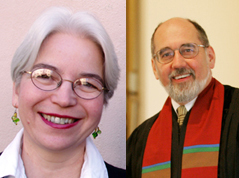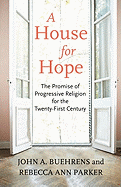Meet the Authors
 Rebecca Ann Parker is an ordained United Methodist minister in dual fellowship with the Unitarian Universalist Association who currently serves as president of and professor of theology at Starr King School for the Ministry in Berkeley, CA. She is the co-author with Rita Nakashima Brock of Proverbs of Ashes: Violence, Redemptive Suffering, and the Search for What Saves Us (2001) and Saving Paradise: How Christianity Traded Love of This World for Crucifixions and Empire (2008). Additionally, Parker serves on the board of an interfaith think tank focused on progressive religion and politics called Faith Voices for the Common Good.
Rebecca Ann Parker is an ordained United Methodist minister in dual fellowship with the Unitarian Universalist Association who currently serves as president of and professor of theology at Starr King School for the Ministry in Berkeley, CA. She is the co-author with Rita Nakashima Brock of Proverbs of Ashes: Violence, Redemptive Suffering, and the Search for What Saves Us (2001) and Saving Paradise: How Christianity Traded Love of This World for Crucifixions and Empire (2008). Additionally, Parker serves on the board of an interfaith think tank focused on progressive religion and politics called Faith Voices for the Common Good.
John Buehrens is an ordained Unitarian Universalist minister who currently serves as minister of the First Parish in Needham, MA. Previously, from 1993-2001, he served as the president of the Unitarian Universalist Association. Buehrens is the co-author with Forrest Church of A Chosen Faith: An Introduction to Unitarian Universalism (1989, 1996) and author of Understanding the Bible: An Introduction for Skeptics, Seekers, and Religious Liberals (2002). Additionally, he serves as national co-chair for Freedom to Marry, as a member of the Board of the Unitarian Universalist Service Committee, and as UU Denominational Counselor and Instructor in UU Polity and Practices at Harvard Divinity School.
Book Basics
Writing as seasoned progressive religious leaders with extensive experience in parish ministry, denominational leadership, and seminary education, Parker and Buehrens offer experiential wisdom marked by hope for what is yet to come in the remaining decades of the twenty-first century. A House for Hope is constructed around the metaphor of a theological house. Each author contributes one or more chapters to each dimension (garden – eschatology, sheltering walls – ecclesiology, roof – soteriology, foundations – theology, welcoming rooms – pneumatology, and threshold – missiology) with the understanding that “no one authoritative voice can claim to speak for all of liberal and progressive religion (p. x). As readers tour the house, they encounter multiple stories of progressive religion in the early twenty-first century, which are masterfully placed in the context of the development of this tradition and alongside the opposing option of conservative religion.
rooms – pneumatology, and threshold – missiology) with the understanding that “no one authoritative voice can claim to speak for all of liberal and progressive religion (p. x). As readers tour the house, they encounter multiple stories of progressive religion in the early twenty-first century, which are masterfully placed in the context of the development of this tradition and alongside the opposing option of conservative religion.
The chapters on soteriology are the strongest contribution to religious dialogue in this century, especially in light of the still dominant conservative Christian language and understanding. Parker summarizes the options at the close of her introductory chapter on the topic thusly:
Some people imagine salvation as a personal escape from divine punishment and hell . . . Others imagine salvation in social and this-worldy terms . . . An additional vision of salvation goes beyond hope for either heavenly reward or earthly success. It recognizes salvation as the gift of full aliveness, here and now, the restored and enlivened capacity to be in the world with wisdom . . . Salvation is not something one possesses individually: it is something one participates in communally, including the communion of those who have come before.
So What?
For those who follow the way of Jesus, how well do you understand the positions of those who are at the opposite end of the theological spectrum? The historical development of the views of your tradition? What activities, in addition to reading this book, might afford an opportunity to enrich your understanding of your view and of other views?
John A. Buehrens and Rebecca Ann Parker. A House for Hope: The Promise of Progressive Religion for the Twenty-first Century. Beacon Press, 2010. ISBN: 9780807001509.